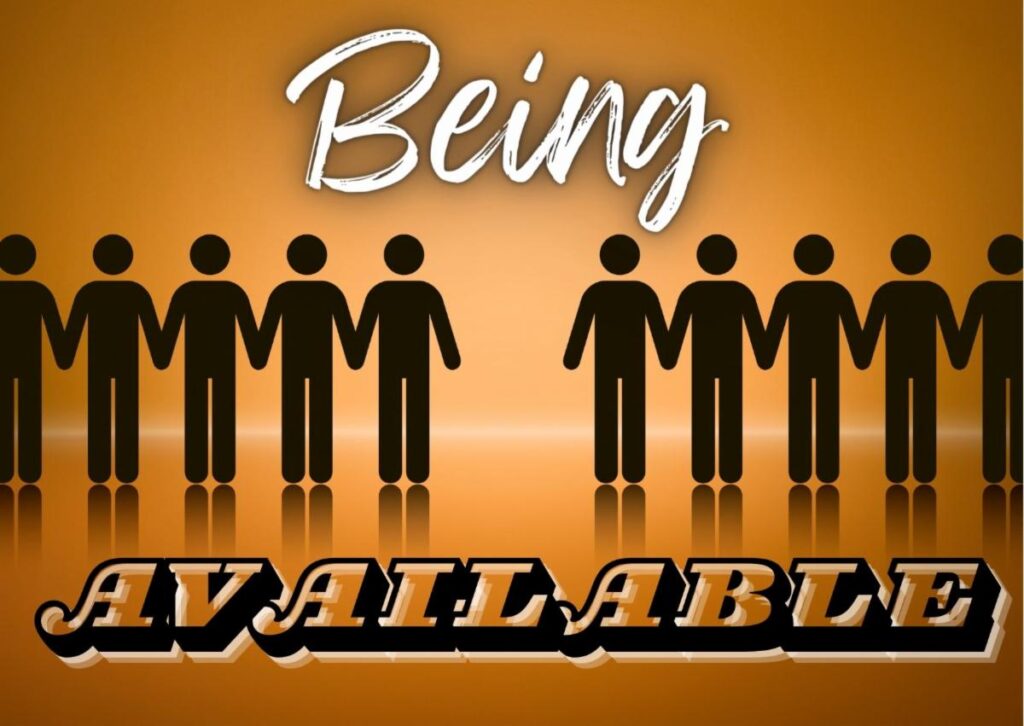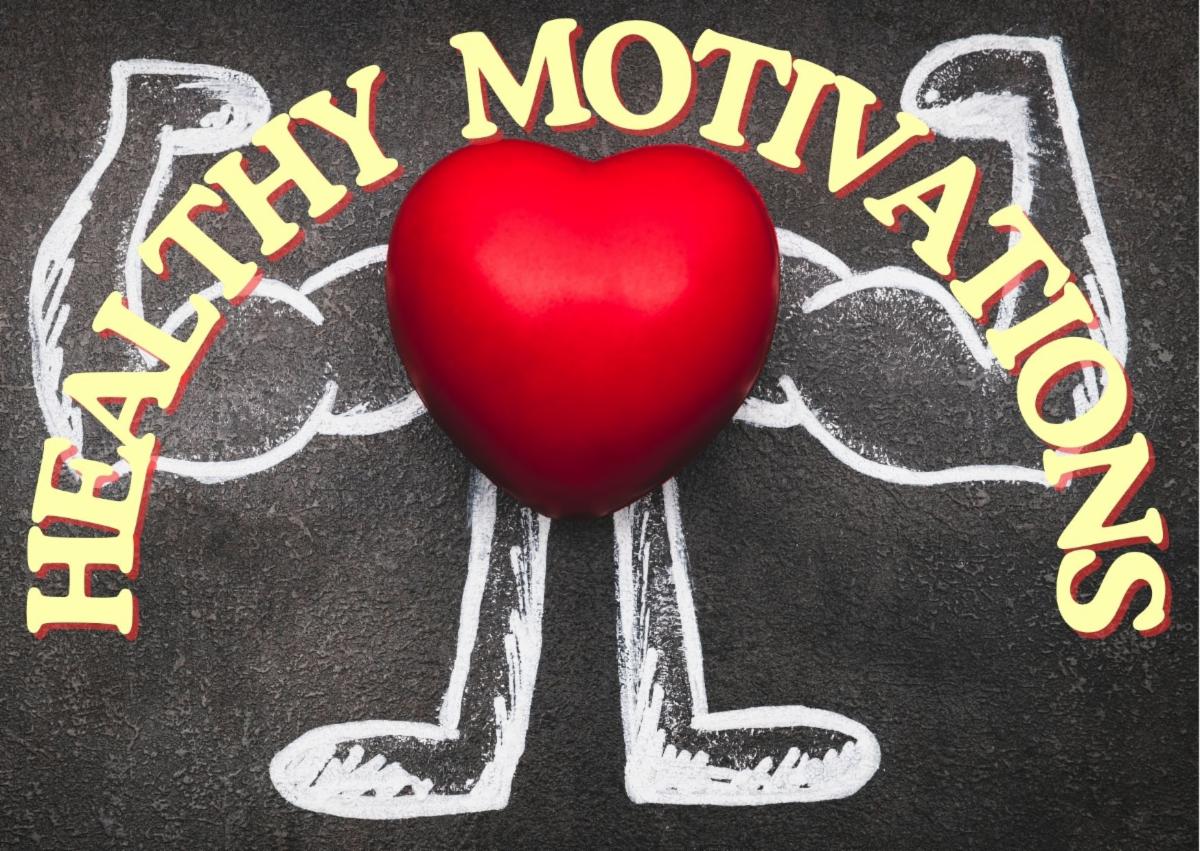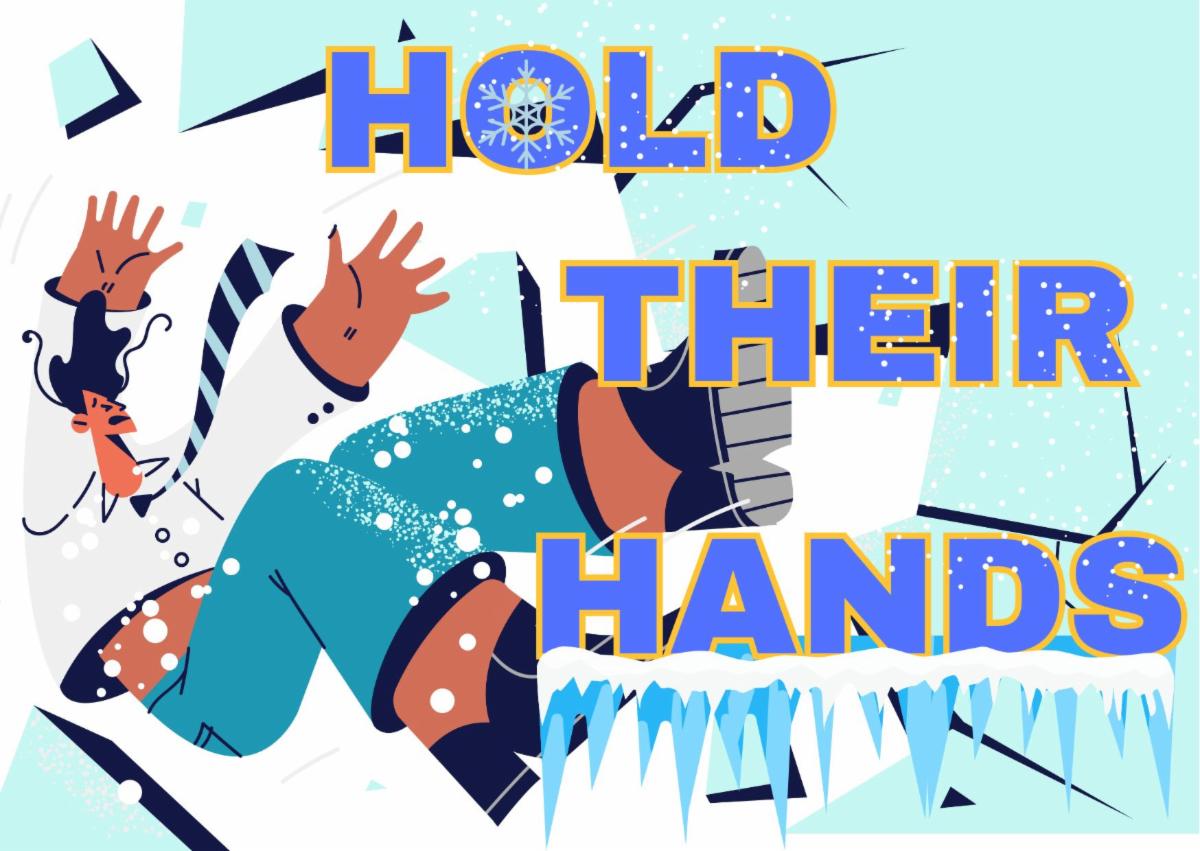
Being Available

Being Available
“How you do anything is how you will do everything.” – Source Unknown.
How did I get here? It’s one of the most frequent questions that people ask me and that I ask myself. How did I end up ministering to a wonderful group of people in Richland, WA? The short answer is “by the provision and direction of God.” However, the long answer has many more twists and turns. If you were to summarize the direction of my life, you could do so with one phrase: “being available.”
I am not the most educated, well-spoken, or Christ-like person. I have no formal training in what I do; I left high school and joined the military, intending never to pursue a career in ministry. I am deeply flawed and inconsistent in how I approach ministry- sometimes, I burn hot and other times, I am lukewarm. What I try to do is, more often than not, I try to live by two principles espoused by Jesus: the greatest commands (Mark 12:29-31) and “zeal for your house will consume me.” (John 2:17).
For me, this means loving God and His people more than anything else. I am not saying I do this perfectly, or even close to that, but I believe it is how I got here.
When I was 18, the Air Force sent me to Minot AFB, ND. I worshipped with that congregation for only one month when the minister asked me to visit, and after a short informal interview, he asked if I wanted to teach the Jr. High/High School class. What had I done to garner this responsibility? I made it a point to be available. That is probably an understatement. I was there if the doors were open, worship times, workdays, potlucks, and even softball games. This mindset used to be the norm; however, now it is an anomaly. I was given opportunities to serve and be useful to God’s kingdom by merely being present.
Opportunities like this have followed me everywhere I have gone. I taught twice a week while I was in South Korea. When I moved to Albuquerque, I taught all age groups until, after seven years and with a lot of external encouragement, I applied for the full-time youth minister position. Yet, I never set out to be a teacher; I merely wanted to be involved. I do not believe I am not an aberration; there was a person who was the epitome of this in the New Testament, Barnabas. We often think of him only as the “encourager,” but his character and mindset were pivotal for the growth of the early church. Look at each of these passages.
Act 4:36-37– “Joseph, a Levite from Cyprus, whom the apostles called Barnabas (which means “son of encouragement”), 37 sold a field he owned and brought the money and put it at the apostles’ feet.”
What is Barnabas going to do? The early church needed funding… he donates the proceeds from his property. Later on, when there is a report of rapid growth in Antioch, the leaders in Jerusalem ask Barnabas to go and check it out (Acts 11:22). You can imagine other people avoiding the journey. In contrast, Barnabas accepts the task because he is available.
Then, when a young man named Saul converts from being a zealous Jew from the sect of the Pharisees, Barnabas travels to Damascus, reaches out to Saul, and takes him to Jerusalem.
Act 9:22, 27 – “Yet Saul grew more and more powerful and baffled the Jews living in Damascus by proving that Jesus is the Messiah. … 27 But Barnabas took him and brought him to the apostles. He told them how Saul on his journey had seen the Lord and that the Lord had spoken to him, and how in Damascus he had preached fearlessly in the name of Jesus.”
And then, when the opportunity came for the body and message of Christ to move across the Aegean Sea, who would they send? It was the guy who had been available every other time, the guy who accepted every other opportunity that came his way.
Act 13:1-3– “Now in the church at Antioch there were prophets and teachers: Barnabas, Simeon called Niger, Lucius of Cyrene, Manaen (who had been brought up with Herod the tetrarch) and Saul. 2 While they were worshiping the Lord and fasting, the Holy Spirit said, “Set apart for me Barnabas and Saul for the work to which I have called them.” 3 So after they had fasted and prayed, they placed their hands on them and sent them off.”
I am still trying to figure out why I am where I am. What I have figured out is that whenever someone needs a servant, I can be there. Whether it is a moving party, workday, Bible class teacher, or a voice singing within a congregation, it may seem simple, but it caused the church to grow in the New Testament and will cause a body to flourish today. When people have big aspirations for a church to grow, I will always return to the Barnabas principle: are there workers? Are people willing to do everything for the body of Christ? More importantly, are people committed to simply “Being Available”?
Taxes

It’s Tax Day across America, April 15, when we pay our “dues” for the country that we live in. Some we feel are justifiably required, others are frivolous, and still, some we think are pure theft. It seems almost ironic that a country once embroiled in a revolution over taxation would one day require so many of them later.
However, taxes are precisely how a populous would fund their local or national government. American realist Benjamin Franklin supposed as much, stating:
“Our new Constitution is now established, and has an appearance that promises permanency; but in this world nothing can be said to be certain, except death and taxes.”
—Benjamin Franklin, in a letter to Jean-Baptiste Le Roy, 1789
Two certainties are death and taxes, and no matter how much you try to avoid either, at some point, your audit will come due, and you will have to settle your account. There are always some notable celebrities who have ineffectually dodged taxation for a while until, finally, they are served a heavy fine for their evasion. I know many people dread April 15 more than any day of the year; one in particular would wait until April 15 to file for an extension. Not only could he not pay, but he also couldn’t bring himself to think of having to pay in the future. I am not a fan of taxes, but I cannot think of a better way to pay for many systems that care for the infrastructure and citizens around me. And so, like Franklin, it accepts the certainty of taxes.
Death and taxes are uncomfortable realities in this world. Most people avoid them because of the stress they bring. There is a part of us that knows the finality of the “deadline,” a specific date when there is no longer any time to adjust our ledger. Paul reveals this truth in his second letter to the church in Corinth.
2 Corinthians 5:10 – “For we must all appear before the judgment seat of Christ, so that each one may receive compensation for his deeds done through the body, in accordance with what he has done, whether good or bad.”
The anticipation of this event can be both comforting and disturbing. For most of us, we probably view it the same way we view Tax Day: We know it is coming, but we don’t want to consider what is actually due. I imagine many people would like to file an extension to extend their date. However, the reality is that we are merely reaping the product of our conduct.
Thankfully, the passage does not end there; Paul continues, describing that there is a way to erase every wrongdoing. He effectively communicates that these transgressions will not be counted against us when the final tally is taken.
2 Corinthians 5:18-21- “Now all these things are from God, who reconciled us to Himself through Christ and gave us the ministry of reconciliation, 19 namely, that God was in Christ reconciling the world to Himself, not counting their wrongdoings against them, and He has committed to us the word of reconciliation. 20 Therefore, we are ambassadors for Christ, as though God were making an appeal through us; we beg you on behalf of Christ, be reconciled to God. 21 He made Him who knew no sin to be sin in our behalf, so that we might become the righteousness of God in Him.”
There is no thought more amazing than the words contained in verse 21. Even though Jesus never sinned, all our sins were charged or accounted to him so that we might be as righteous as he is. We all owe more wages (death) than we could ever repay, yet we will not have to pay that price. When that day of accounting arrives, and we stand before the throne, we enter that peace, knowing that through Jesus Christ, not a single wrongdoing will be counted against us.
It would be like our federal government sending you a letter informing you that you will never have to pay taxes again. No sales, income, or property tax will ever be charged. The benefits you receive have been paid in full, and you never have to worry about getting a “past due” notice in the mail. While taxes may be a necessity or certainty in this life, when you are washed in the blood of Christ, your sins are remembered no more, and you don’t have to worry about paying your final taxes.
“Be not as one that hath ten thousand years to live; death is nigh at hand: while thou livest, while thou hast time, be good.”
Marcus Aurelius
Bathtubs

Entering my fourth decade, I’ve spent enough time on this planet to know a few things. One fear sells. When people are worried, they buy or acquire items to help them in a crisis. And number two, there is a new disaster to worry about every decade. Many of us remember Y2K, and we were encouraged to prepare for the end of the digital age; computers will crash, and financial markets will suffer… we should all fill our bathtubs with water and prepare for the end of the world at midnight.
Then again, in 2012, based on the calculations of the Mayans, the world was going to end. Doomsday predictors caused many people to fret about how the world would end, and once again, we should fill our bathtubs with water.
Although on a different scale, I have even heard about the predictions concerning today’s solar eclipse. This is it, the big one—there will be power surges, terrorist activity, and crumbling infrastructure. And what I have learned is that I need to fill my bathtub with water.
If I have just enough water, I can survive for a few more days. If everything crumbles around me, I can outlast my neighbors and hopefully emerge into a new world. I always think, “What happens if that next cataclysm lasts longer than a few days?” You can buy supplies that last six months- what if you need to survive seven months? No matter how much you plan or what you are worried about, there will come a time when something truly unexpected happens.
2 Peter 3:10-14 – “But the day of the Lord will come as unexpectedly as a thief. Then the heavens will pass away with a terrible noise, and the very elements themselves will disappear in fire, and the earth and everything on it will be found to deserve judgment. 11 Since everything around us is going to be destroyed like this, what holy and godly lives you should live, 12 looking forward to the day of God and hurrying it along. On that day, he will set the heavens on fire, and the elements will melt away in the flames. 13 But we are looking forward to the new heavens and new earth he has promised, a world filled with God’s righteousness. 14 And so, dear friends, while you are waiting for these things to happen, make every effort to be found living peaceful lives that are pure and blameless in his sight.”
We anticipate the world to come, not by stocking up on supplies and hoarding drinking water, but by living in a way that pleases God. Those unexpected moments will happen to each of us, and our response should be whether we have become pure and blameless in God’s sight. The answer for those washed in the blood of the Lamb is a resounding “Yes.” We might be preparing for the next big disaster and even live as though the sky is perpetually falling. You might decide to live with your bathtub full of water, hoping it will provide you with some security. However, at some point, that water will run dry. At some point, you will need to find a true water source. I encourage you to tell your loved ones about the well that never runs dry.
John 4:13-14 – “Jesus replied, “Anyone who drinks this water will soon become thirsty again. 14 But those who drink the water I give will never be thirsty again. It becomes a fresh, bubbling spring within them, giving them eternal life.”
Then, you won’t have to worry about filling up your bathtubs.
Foolish

April Fool’s Day. I have never been one for pranking others. Sure, every once in a while, it is fun to hide and scare someone (and in a church building, it happens often). Some people get into elaborate pranks; throughout the ages, companies, presidents, and even entire countries have tried to fool others on the first day of April. In the military, there were simple, harmless pranks where you would ask a new airman to get a fresh exhaust sample from a forklift, hand them a garbage bag, and watch the hilarity ensue.
The pulpit minister at my previous job was an expert prankster; some people changed his name from Rick Hankins to Rick “Prankins.” An electrician by trade, he made a practice of wiring metal doorknobs to provide low-voltage shocks for any unsuspecting victim. There was nothing and nowhere safe on the first day of April. I encountered my fair share of pranks, and onlookers always wondered if I ever wanted to get even with him. But this is the reality: there is no “getting even,” only a continual process of pranks progressively becoming more intense. One time, I thought I could prank Rick. I waited for him to go on vacation and filled his entire office with balloons. Only to find out the next time I left, he glitter-bombed my desk and then wrapped it in plastic wrap. So, I quickly concluded that at some point, I would always be the fool and give up trying to out-prank him.
Luke 12:13-21 – “Then someone called from the crowd, “Teacher, please tell my brother to divide our father’s estate with me.” 14 Jesus replied, “Friend, who made me a judge over you to decide such things as that?” 15 Then he said, “Beware! Guard against every kind of greed. Life is not measured by how much you own.” 16 Then he told them a story: “A rich man had a fertile farm that produced fine crops. 17 He said to himself, ‘What should I do? I don’t have room for all my crops.’ 18 Then he said, ‘I know! I’ll tear down my barns and build bigger ones. Then I’ll have room enough to store all my wheat and other goods. 19 And I’ll sit back and say to myself, “My friend, you have enough stored away for years to come. Now take it easy! Eat, drink, and be merry!”‘ 20 “But God said to him, ‘You fool! You will die this very night. Then who will get everything you worked for?’ 21 “Yes, a person is a fool to store up earthly wealth but not have a rich relationship with God.”
There is a type of fool who desires to chase the things of this world. It becomes an insatiable quest. Before Jesus tells this parable, the desire for the things of this world had come between two brothers; even more heartbreaking, it is happening as they grieve their father’s death. This is precisely the fool’s errand, to pursue something that has no end, to chase after something that becomes all-consuming. Paul would write to the church in Colosse mourning this mentality,
“They are headed for destruction. Their god is their appetite, they brag about shameful things, and they think only about this life here on earth. 20 But we are citizens of heaven, where the Lord Jesus Christ lives. And we are eagerly waiting for him to return as our Savior.” (Philippians 3:19-20).
The contrast between these groups of people is evident. One chases after only things on this earth, and the other is secure because they are citizens in heaven, where gold has no value and where moths and rust do not destroy.
Foolishness. There is always a level of “one-up-man-ship” when pranking someone. However, in the end, both will inevitably be the fool. The only way to come out ahead is not to participate. The same goes for placing our hopes in the things of this world. If we chase the treasures of this world, we participate in a cycle that leaves us playing fools. It will harm our closest relationships and eventually disappear, and perhaps that is the greatest prank of all to invest time, energy, and resources into something that will not last forever. Instead, store up your relationship with God so you will not be considered foolish.
Fall Into Temptation

We have all stumbled across the “Serenity Prayer” at some point in our lives. Attributed to Reinhold Niebuhr, it contains a lot of truth. You may be surprised that it is longer than the abbreviated opening stanza. After reading it, you will understand why most organizations omit the second half.
“God grant me the serenity
To accept the things I cannot change;
Courage to change the things I can;
And wisdom to know the difference.
Living one day at a time;
Enjoying one moment at a time;
Accepting hardships as the pathway to peace;
Taking, as He did, this sinful world
As it is, not as I would have it;
Trusting that He will make things right
If I surrender to His Will;
So that I may be reasonably happy in this life
And supremely happy with Him
Forever and ever in the next. Amen.”
This poem contains some truths about life. There are so many things that I cannot change, and more troubling, there are many things that are “not as I would have it.” Reinhold powerfully observes that many of the things that trouble us are due to the sinful/fallen world we live in.
Like most siblings, our three boys know how to push each other’s buttons. Sometimes, it is malicious and intentional, and sometimes, it happens by living in proximity to other humans. All children can be highly reactionary, and Milo has figured out that it is fun to watch his brothers explode when things aren’t going their way. My job as a parent is to teach them that no matter what is happening to them, they are only responsible for how they react. Someone can take your favorite toy, you might fall off your bike, or someone might call you a rude name; however, these things can only bother you as much as you let them. So I give them that sage fatherly advice: “Don’t let him bug you.”
The world can and will relentlessly and mercilessly throw obstacles and trials at us, and as Christ-followers, we must know how to respond and discover how to be like Christ in the most challenging moments.
The synoptic gospels of Matthew, Mark, and Luke record Jesus’ moments before his betrayal in the Garden of Gethsemane. Jesus knows that for his disciples, this will be a situation far outside of their control and not the way they would have it. He knows their entire paradigm and worldview will be turned upside down. Amid his agony, he gives them instructions to consider. Here is Luke’s account:
Luke 22:39-46 – “39 And He came out and went, as was His habit, to the Mount of Olives; and the disciples also followed Him. 40 Now when He arrived at the place, He said to them, “Pray that you do not come into temptation.” 41 And He withdrew from them about a stone’s throw, and He knelt down and [began] to pray, 42 saying, “Father, if You are willing, remove this cup from Me; yet not My will, but Yours be done.” 43 [Now an angel from heaven appeared to Him, strengthening Him. 44 And being in agony, He was praying very fervently; and His sweat became like drops of blood, falling down upon the ground]. 45 When He rose from prayer, He came to the disciples and found them sleeping from sorrow, 46 and He said to them, “Why are you sleeping? Get up and pray that you do not come into temptation.”
The temptation for them and all of us is to Abandon, Disown, and Deny. When you are presented with challenging and “button-pushing” situations, you may desire to rebel against God, question His goodness, disregard His authority, and ignore His provision for us. These temptations are real and persistent; Jesus’ words are for us to prepare for them, asking God to assist us before they happen. Jesus knows what is about to happen, and he wants his disciples to pray that they are prepared to act the way he will when the temptation comes. We know the narrative, except for John (who follows at a distance); they all fall into this snare.
Although they all stumbled to an extent, the hindsight of Jesus’ words would serve them well in the future. Whether they were about to be beaten, imprisoned, or executed- I am confident they prayed they would not fall into that same temptation.
On a far smaller scale, this is my same request for my kids. We don’t have to be reactionary, exploding, or imploding when things do not go our intended way. Someone may hurt us, a disease may disrupt our plans, or we may have stumbled in our walk, but our goal is to prepare for the next opportunity and ask God so He can strengthen us for the next time. So that we won’t abandon, disown, or deny Him. Our sufferings can leave scars and wounds that are imperceptible yet very real; however, it is up to me how I let it affect me. No matter what the world throws at me, I don’t have to fall into temptation.
Healthy Motivations

It might be the new American pastime, weight loss. Everywhere you turn, there is a new system or plan to drop some unwanted pounds. Rightfully so, according to the Centers for Disease Control and the National Institute for Health, 73.6% of Americans are overweight. Studies have shown that even a moderate loss of 10 pounds lowers the risks of cardiovascular diseases, such as kidney disease, high cholesterol, and hypertension. A quick online AI search will give you the following internal improvements: a healthier immune system, reduced joint pain, increased life expectancy, better sleep, more energy, improved memory, less anxiety, and a better mood.
Even with all these health benefits, most people’s true motivation is to be more attractive to others. In other words, we want to be a little slimmer not for the intrinsic value but for the way we will look. As we age, we become more concerned with the health benefits, but on some level, we are consumed with our external appearance and how that might improve if we only lost some poundage.
As I write this, I am cathartically discussing my journey. Personally, I want to lose a few extra pounds, but sometimes, I find the health benefits to be a poorly recognizable metric. I won’t be able to perceive some of these internal outcomes for a long time, if ever. However, I can see the results in the mirror.
In our class on Galatians, we have been studying how easy it was for that early church to want to adhere to the Mosaic Law. It is nice to have easily defined measurables that provide instant feedback. You are circumcised, or you aren’t, whether you eat kosher meals or you don’t—clear cut and definitive. Yet Paul makes it known that being a follower of Christ is about a change of heart because of faith. It reminds me of our Life Group Study in Mark, as Jesus addressed the objection of the Pharisees regarding the washing of hands.
Mark 7:14-15, 17-23 – “After He called the crowd to Him again, He [began] saying to them, “Listen to Me, all of you, and understand: 5 there is nothing outside the person which can defile him if it goes into him, but the things which come out of the person are what defile the person.”… And when He later entered a house, away from the crowd, His disciples asked Him about the parable. And He said to them, “Are you so lacking in understanding as well? Do you not understand that whatever goes into the person from outside cannot defile him, because it does not go into his heart, but into his stomach, and is eliminated?” (Thereby He declared all foods clean.) And He was saying, “That which comes out of the person, that is what defiles the person. “For from within, out of the hearts of people, come the evil thoughts, acts of sexual immorality, thefts, murders, acts of adultery, deeds of greed, wickedness, deceit, indecent behavior, envy, slander, pride, and foolishness. “All these evil things come from within and defile the person.”
It is easy to get into the idea of external measurables, actions like washing your hands or keeping the Sabbath to demonstrate your piety. Looking inward and discovering the root of your spiritual unhealthiness is far different. Additionally, when we only focus on those items that are externally measurable, we neglect or avoid those issues that are harder to change. Notice that Jesus doesn’t tell the crowds not to wash their hands but that there is a deeper issue and, more importantly, a better motivating factor. He advises them to consider the proximity of their hearts to God (Mark 7:6).
There are no spiritual cholesterol tests or heart monitors to diagnose these issues; You must discover and eliminate these roadblocks as you walk in the light. Thankfully, God has blessed us with His Spirit to reveal to us these things (John 16:13) so that our hearts do not hold onto these devastating ailments.
I encourage you to reflect on these thoughts over the next week and whether you are merely focusing on the externals of your faith or whether you are drawing near to God with healthy motivations.
Try.

Crunch. An innocent onomatopoeia- that carries a lot of weight. We enjoy the word when we are dealing with cereal but despise the word when we are driving a car. Anyone who has ever experienced even the slightest buckling of plastic and metal knows the sinking feeling of dread when your vehicle strikes another object. Whether it is your fault or not, few people want to inspect the damage after the smallest of fender benders.
Hopefully, you are adequately insured so that the sting of an accident is not as painful.
Insurance is a bizarre concept in our society. There are different types of insurance, and each category carries a different expectation if you ever use it.
Auto- probably, but hopefully not.
Health- absolutely, and optimistically, it will adequately defer significant costs.
Life- I certainly hope not.
Health- absolutely, and optimistically, it will adequately defer significant costs.
Life- I certainly hope not.
You can safeguard a vacation or event in case you can’t attend, accepting the randomness of life and how quickly it can change. Some people enter marriage with a form of insurance called a pre-nuptial agreement, hedging their assets in the event that their relationship doesn’t work out. Many businesses require a deposit to avoid losing money if a particular obligation is missed. The reality is that most people and transactions plan to fail. As we have seen, most people use an insurance policy knowing there will be a mishap and place a guarantee on that instance.
We do the same thing in our relationship with God. However, we know two main things: 1) God is Faithful and True (Psalms 33:4), and “blood of Jesus Christ His Son cleanses us from all sin.” (1 John 1:7).
Many people see a passage like this and emphasize the promise of cleansing and use this as some eternal insurance; a proverbial “get-out-of-jail-free card,” knowing that when they mess up, there will be reparation for their slip. However, John does not write this to encourage a “license to sin.” Instead, the entire context is to persuade us to “walk in the light.”
1 John 1:5-8 “5 This is the message which we have heard from Him and declare to you, that God is light and in Him is no darkness at all. 6 If we say that we have fellowship with Him, and walk in darkness, we lie and do not practice the truth. 7 But if we walk in the light as He is in the light, we have fellowship with one another, and the blood of Jesus Christ His Son cleanses us from all sin. 8 If we say that we have no sin, we deceive ourselves, and the truth is not in us.”
An intriguing passage to consider: choosing to walk in the light carries the understanding that you must also be willing to admit to your failings. The first paradigm to consider is that the character of God measures the entire passage. God doesn’t simply dwell in the light; He is light. Therefore, to have true communion, walking with Him, we should attempt to remove all forms of darkness from our lives. However, we all know the difference between “trying” and trying. An easy earthly example is that some people try to lose weight but don’t change any habits, while others change their diet and activity levels to succeed in their goals. Some people “try” to walk in the light, and some people strive to walk in the light.
John will put it this way as he continues the same thought in the next chapter. Once again, this isn’t an insurance policy we want to use, but it is there when we need it.
1 John 2:1-6 – “My little children, these things I write to you, so that you may not sin. And if anyone sins, we have an Advocate with the Father, Jesus Christ the righteous. 2 And He Himself is the propitiation for our sins, and not for ours only but also for the whole world. 3 Now by this we know that we know Him, if we keep His commandments. 4 He who says, “I know Him,” and does not keep His commandments, is a liar, and the truth is not in him. 5 But whoever keeps His word, truly the love of God is perfected in him. By this we know that we are in Him. 6 He who says he abides in Him ought himself also to walk just as He walked.”
John’s first statement holds the intention “so that you may not sin.” The desire is for us to abstain from the sinful world around us. We have a righteous Advocate who has paid the price, and therefore, we are empowered to walk in the light. The phrase bookends this thought: “ought… to walk as He walked.” We know that Jesus was sinless and perfect, a humanly impossible achievement; John previously mentioned that our first step in walking in the light is to admit that we have sinned (1 John 1:8).
Our attitudes and lives should be that we do not want to sin. We desire to walk in the light. We thank God that there is a payment for our past and future transgressions. However, our goal is not to indulge the passions of the flesh but to walk as Jesus walked. Just because it is difficult does not mean we shouldn’t Try.
The Lion and the Lamb

The old proverbial saying goes something like, “March comes in like a lion and will go out like a lamb,” at least we all hope so. We hope the transition from winter to spring will bring a more pleasant shift.
However, there is some debate about how this phrase came into existence. Some claim it is purely weather-related and closely tied to superstition, where people welcome a subdued spring.
There may be some truth to this as the northern polar jet stream usually shifts at this time of year and heads further north, often manifesting in violent winds and leaving warmer seasons behind; in fall, this northern stream will move further south, bringing on fall and winter.
Others will claim it has astrological beginnings as the constellation Leo (Lion) will give way to Ares (Lamb) in the night sky. Astronomers would watch the night sky and note which star groups appeared center stage, and these constellations provided some meaning to the lives of those meandering on the earth below.
However, my favorite interpretation and origin explanation only happens every few years. It occurs when we highlight the anniversary of Jesus’ death, burial, and resurrection within the month of March. 2024 is one of those years, and it is a great time to remember the final events of Jesus’ earthly ministry.
In all four gospels (Matt 21:1–11; Mark 11:1-11; Luke 19:28–40; John 12:12–19), the writers declare that Jesus rode into Jerusalem as a triumphant king and leader. Matthew, Mark, and Luke then describe the overturning of the tables of the moneychangers, an act reminiscent of a roaring lion, full of righteous indignation, stating,
“It is written,” he said to them, “‘My house will be called a house of prayer,’ but you are making it ‘a den of robbers.'” (Matthew 21:13).
However, as the narrative continues, we see the meekness of Jesus, possessing all authority and yet humbling himself for his disciples and the world. As he washes their feet (John 13:5), he tells them self-sacrifice is the definition of a disciple: “I have set you an example that you should do as I have done for you.” (John 13:15).
Ultimately demonstrating his humility and submission to the world, holding to the prophecy of Isaiah,
“He was oppressed and afflicted,
Yet He did not open His mouth;
Like a lamb that is led to slaughter,
And like a sheep that is silent before its shearers,
So He did not open His mouth.” – Isaiah 53:7
The apostle John highlights this transition from Roaring Lion to Sacrificial Lamb in Revelation 5:1-10. As John receives this revelation from Jesus, he weeps because there is a sealed scroll that no one can open. That is when we see this tremendous chain of events, “And one of the elders said to me, “Stop weeping; behold, the Lion that is from the tribe of Judah, the Root of David, has overcome so as to be able to open the scroll and its seven seals.” 6 And I saw … a Lamb standing, as if slaughtered,… 9 And they sang a new song, saying, “Worthy are You to take the scroll and to break its seals; for You were slaughtered, and You purchased people for God with Your blood from every tribe, language, people, and nation. 10 You have made them into a kingdom and priests to our God, and they will reign upon the earth.” (Revelation 5:5-6, 9-10).
“In like a lion and out like a lamb.” This phrase moves me to recall and reflect on Jesus, who walked into Jerusalem as a lion yet chose to be led like a lamb to the slaughter. As we live, we should keep this attitude in mind as we try to emulate the Lion who chose to become a Lamb.
Best for Everyone

My boys don’t understand my motives all of the time. As someone who has lived longer, I can also observe situations that will escalate and end in injury or property damage. As an adult in our relationship, I can better perceive a situation’s cause and effect and keep the perils of life away from them. And so, as I watch my boys run around my house with three-foot wooden dowels, swinging them chaotically, I know that this is a recipe for disaster. However, to my sons, I am only ruining their fun and being a “meanie” when, in reality, I am protecting them from the dangers they are not aware of yet. As I observe humanity, I am aware of the duality of our condition- on the one hand, we want parameters to live by, but we also don’t like for anyone to interrupt our “status quo.”
Churches of Christ are an anomaly. There are a variety of things we do that are contrary to other Christian group practices. One of those differences, and one I am convinced that we adhere to and excel at, is church structure.
Some groups have one senior leader who calls the shots and “runs” the church. They function like a CEO and rule the roost, controlling the direction of the gathering. Other groups elect a board of directors to govern the church. These individuals rotate and share the load regarding the “business” of the assembly. Still, others gain direction and directives from a regional or corporate office; they set a standard and manage the group’s affairs from afar. If all of this seems cold and objective, that’s because it is- when groups operate like this, they become more of a business and less of a family. Our desire should be to keep the Bride of Christ from turning into a business.
There must be a better way, and there is an ideal model we follow that is influenced and supported by scripture. As a body of “sheep,” we are appropriately described as a flock; therefore, we need shepherds to tend to our needs. Paul, departing from Miletus and bypassing Ephesus, meets with their leaders and gives this exhortation.
Acts 20:17, 28 – “From Miletus he sent word to Ephesus and called to himself the elders of the church. … 28 “Be on guard for yourselves and for all the flock, among which the Holy Spirit has made you overseers, to shepherd the church of God which He purchased with His own blood.”
This pivotal passage contains the understanding of God’s view of church leadership. Elders, overseers, bishops, shepherds- all these terms refer to the same group of individuals. Paul charges these individuals with meeting the needs of the body of believers that the Holy Spirit directed under their care. It is a lofty goal and a heavy responsibility.
From this concept, there became a bridge between Greek and Latin, as Latin became the predominant language of religious activities for 1200 years. The Latin word for a herdsman- “pascere” from the root word to feed — became anglicized to our term “pastor .” A pastor is, therefore, one who looks after the flock. Based on these definitions, three individuals in our body are unsung heroes in my book. Three individuals who continually put other’s needs above their own; physically, spiritually, and emotionally- these men definitively tend to the flock.
Most Christians are only concerned about their own spirituality and eternal security. Some might be selfless enough to consider a friend’s or two’s spiritual health as well. However, a shepherd must consider the entire flock’s health, safety, and security. This can mean that when someone needs visitation or prayers- they are there. When someone needs spiritual advice- they are there. When someone needs a shoulder to cry on- they are there. And when a sheep has wandered from the fold and is dangerously close to falling off a cliff- they are there. They look after the health and well-being of everyone entrusted to their care. That means not only the one sheep who wanders away but also the ninety-nine that never left and now must delicately integrate the one who strayed.
Recall the parable of the prodigal son. Which son needed more guidance, the wayward wanderer or the older son that never parted with the Father?
It is a lonely and ostracizing responsibility; someone will always be unhappy with any major decision. And as Paul mentioned in his message to the elders in Ephesus, sometimes the only things you will attract are “savage wolves and false messengers” (Acts 20:29-30). Setting the example for those around them, they must be “above reproach, faithful to the word and able to exhort” (Titus 1:7-9). Finally, for those who are not elders, bishops, overseers, or shepherds, the apostle Peter has these words for us to adhere to.
1 Peter 5:5-8 – “You younger men, likewise, be subject to your elders; and all of you, clothe yourselves with humility toward one another, because GOD IS OPPOSED TO THE PROUD, BUT HE GIVES GRACE TO THE HUMBLE. 6 Therefore humble yourselves under the mighty hand of God, so that He may exalt you at the proper time, 7 having cast all your anxiety on Him, because He cares about you. 8 Be of sober spirit, be on the alert. Your adversary, the devil, prowls around like a roaring lion, seeking someone to devour.”
There is always a serious threat from our greatest adversary looming outside our village. And few people are willing to keep that prowling lion at bay, risking their own “skin” in the ensuing fray. Some sheep know the danger- rebuff the shepherds and wander off in their own direction, confident in their own abilities and highlighting their autonomy. Others will see the wisdom of someone who has lived longer, entrusted with a responsibility by the Holy Spirit, and values the kingdom above their own entitlements; humble themselves and submit to the shepherds. This epitomizes the role of a shepherd: to uphold the values of God’s Kingdom, take care of those around them, and guide the flock to love God completely.
Relating this to my kids, they are still growing, and they will only see my guidance as wisdom once they have made their own mistakes. Until that day, I will do my best to keep them from hurting themselves or others, not because I am a tyrant but because I want to prolong their life and make them successful. Therefore, I will guide them and hope that one day they understand that I only want what is best for everyone.
Thank you, Dan, Mark, and Rod- for your diligence in taking care of the flock at Richland.
Love Stinks

Maybe the J. Geils Band had it right- “Love Stinks.” In their song by the same name, their group laments that when you open yourself up to love another individual, you will almost inevitably have your heart broken at some point. In middle school, I thought I had it all figured out. I would become a hermit and live in a remote cabin in the woods. Keep in mind I grew up in the 1990s, long before the current trend of off-grid living had taken root. I came to this novel conclusion about remote living because it seemed easier than dealing with other humans. People are a part of life, but they come with their fair share of issues, and for a middle school-aged boy, the logical choice is removing the root of the problem, and that catalyst is the other people.
I hope you don’t misunderstand my sentiment. It is not that I don’t love people because, in fact, I love people so much that I will inevitably get hurt by them. Some have learned this through trial and error and will keep their relationships shallow and superficial. More people operate in this regard because we have all learned at some point that if we trust someone, they will betray our trust.
This is the archetype of Jesus and Judas. Allowing someone into your inner circle of relationships, knowing full well they will betray you and your confidence. I wonder how often that reality played into the disciples’ minds after Jesus ascended to Heaven. As the gospel spread throughout the world, there was always the possibility that someone would harm or hurt them, yet they spread the gospel near and far anyway. They could do this because of the example of Jesus- loving Judas in every situation.
This is why we call this message the “Good News” that Christ died for us even while we were backstabbing enemies.
Romans 5:7-11 – “Very rarely will anyone die for a righteous person, though for a good person someone might possibly dare to die. 8 But God demonstrates his own love for us in this: While we were still sinners, Christ died for us. 9 Since we have now been justified by his blood, how much more shall we be saved from God’s wrath through him! 10 For if, while we were God’s enemies, we were reconciled to him through the death of his Son, how much more, having been reconciled, shall we be saved through his life! 11 Not only is this so, but we also boast in God through our Lord Jesus Christ, through whom we have now received reconciliation.”
From a human perspective, you might be willing to help a good or possibly a righteous person (although “righteous” people are more challenging to deal with), but no one dies for an enemy. It is ludicrous even to fathom the idea of trading your life for someone who is actively against you. And yet, time and time again, we read that this is the message of Christ: giving your life self-sacrificially for others- regardless of what they may do to you in the end.
Valentine’s Day is only a few days away when we champion love in its most romantic forms. However, the “Day of Love” often creates tension as people either feel rejected, forgotten, or confounded by the practices of love. The Day will cause many others to bemoan that “Love Stinks.” And yes, from a purely humanistic point of view, love can be painful. And the deeper the love, the more pain it can cause.
Our example of Jesus experienced the most painful display of love. But hopefully, that doesn’t make you give up on love. That would be the easy way out. It would be easiest to escape to a remote cabin and disappear from a world filled with not-so-good people. However, that would contradict the message of the cross and the good news it brings. Therefore, we love the unlovable even when it stinks- becoming a beautifully fragrant aroma not to ourselves but for God.
Ephesians 5:1-2 – “Therefore be imitators of God, as beloved children; 2 and walk in love, just as Christ also loved you and gave Himself up for us, an offering and a sacrifice to God as a fragrant aroma.”
Love has a smell, but it definitely does not stink.
Thick and Thin

In high school, I loved participating in track and field. For me, there was nothing better than feeling the air move past me at an accelerated pace. I enjoyed the excitement of a track meet. It was your opportunity to see where you stacked up against your competitors. I loved the idea of giving my best effort and that feeling of accomplishment. However, I was not too fond of the early-season preparation. I might be “old school,” but I know two main ways to get faster on race day: running up hills and training for endurance. If you combine those two elements, most runners will improve their race time at least marginally.
Near the practice track, there was a hill that was about 1000 feet long with a 10% grade, the “9th St Hill.” Our coach would set a timer, and your responsibility was to see how many hills you could do in 30 minutes. You could walk, jog, or sprint. But only one of those will get the results that you want. Some people would sprint one hill and walk the rest, others would lazily jog, and others would push themselves and endure the hardship, aiming to improve themselves as they prepared for race day. Some were running with a more noble motivation. They are not practicing simply because it is a requirement from the coach but because it will help them succeed in the long run (pun intended).
In the last blog, we reflected on Paul’s message to the church in Corinth regarding “true ministers.” I did not know how accurate these verses were until 2023. However, some pearls of wisdom can encourage us and give us insight into our various ministries.
2 Corinthians 6:4-5 – “In everything we do, we show that we are true ministers of God. We patiently endure troubles and hardships and calamities of every kind. 5 We have been beaten, been put in prison, faced angry mobs, worked to exhaustion, endured sleepless nights, and gone without food.”
The term minister has taken on a connotation of its own. It used to refer to someone who was an agent of some service or person. A minister could be someone dispensing care to another individual. However, it most commonly began to refer to an individual who was an agent on behalf of religion. Eventually, the term became a job title and not just a description of someone’s actions. The root word in this passage refers to someone who is a servant.
Therefore, in this passage, Paul refers to the “true servants” of God. You could also look at this as the opposite of a false minister, or rather one who administers with false pretenses or motives. Consequently, let’s note what Paul says is a marker of a true minister.
A faithful minister is someone who does not quit. Paul strengthens this as he states they patiently endure. They could give up or find a different path, but instead, they patiently endure. To remain steadfast in the face of affliction. You could stop, and many do, but it is those who keep going that show where their strength comes from. Paul even references those things that make other people quit—everything ranging from beatings at the hands of an angry mob to sleepless nights. Yet, the important thing is to keep going. We should view this concept in light of Jesus’ words in John 10.
John 10:11-14 – “I am the good shepherd; the good shepherd lays down His life for the sheep. 12 “He who is a hired hand, and not a shepherd, who is not the owner of the sheep, sees the wolf coming, and leaves the sheep and flees; and the wolf snatches them and scatters the flock. 13 “He flees because he is a hired hand and does not care about the sheep. 14 “I am the good shepherd, and I know My own, and My own know Me,”
Some “minsters” are only there for the paycheck. Some will quit the moment someone disagrees with them or makes them lose sleep. Some will not endure a hangnail, let alone actual hardships. Staying or running is what separates the real from the counterfeit. Jesus says that merely seeing a wolf will cause some to run away. My encouragement to you is to stick it out. When troubles come your way, when you serve others, don’t run away when things get messy or complicated. Stay with that person. They will recognize you as someone who actually cares, a true minister who will stick with them through Thick and Thin.
Hold Their Hands

I love my sons equally. In my heart, there is no distinction between them, but they have vastly different personalities and abilities. One of my sons is clumsy, a king of klutz, a professional of pratfalls. He could trip over a breeze. I am the opposite; I have the skill of a mountain goat, skittering across rocks. It is rare for me to hit the ground, and my son practically lives on the floor. And do you know what I do? I hold his hand. Yep, because if he falls, and I know he will, I want to be there to keep him from getting hurt or stumbling. If I can walk in such a way that helps him keep his balance, I will do that.
As I began to unpack the totality of ministry, there was a passage that hit close to home. It made me pause because of the gravity of the section. Paul is writing his second (possibly third) letter to the church in Corinth. He is establishing the genuineness of his heart and the authenticity of his message. Yet, in this passage, he states the hallmarks of a “true minister.” I don’t believe that a person must undergo each of these situations; however, we should all prepare to have them present in their lives. He also provides a template for how ministers should behave, which we can all apply to our behaviors.
2 Corinthians 6:3-10 NLT – “We live in such a way that no one will stumble because of us, and no one will find fault with our ministry. 4 In everything we do, we show that we are true ministers of God. We patiently endure troubles and hardships and calamities of every kind. 5 We have been beaten, been put in prison, faced angry mobs, worked to exhaustion, endured sleepless nights, and gone without food. 6 We prove ourselves by our purity, our understanding, our patience, our kindness, by the Holy Spirit within us, and by our sincere love. 7 We faithfully preach the truth. God’s power is working in us. We use the weapons of righteousness in the right hand for attack and the left hand for defense. 8 We serve God whether people honor us or despise us, whether they slander us or praise us. We are honest, but they call us impostors. 9 We are ignored, even though we are well known. We live close to death, but we are still alive. We have been beaten, but we have not been killed. 10 Our hearts ache, but we always have joy. We are poor, but we give spiritual riches to others. We own nothing, and yet we have everything.”
There is no doubt that Paul and his companions endured more trials than I pray I will ever need to face. Verse five is enough to make any devout follower of Christ pause momentarily. Yet we see the sincerity of God’s intentions lived out in the life of Paul as he brings good news to anyone who will listen.
Paul states that he will live in such a way that “no one will stumble because of us, and no one will find fault with our ministry.” Living in this manner is a tall order. Paul took his ministry very seriously, and we often want to toe the line and find ways to be “friends with the world” (James 4:4). Paul’s goal was to live in such a way that others would be drawn closer to God because of his actions; even if it meant that he would suffer. Now, keep in mind that this is not asceticism, a mere outward showing of religiousness, but a desire to show the sincerity of his heart.
Some people have different aptitudes for balance and stability. My son is a prime example. However, if I chose to walk haphazardly through life, I would not benefit him. If I am aware of his penchant for falling but walk in such a way as to make him stumble more, what kind of parent would I be? I walk in such a way so that he won’t fall. Last week, we had a terrible ice storm. Did I walk next to him and chaotically and frantically flail? Or did I watch my footing a little more firmly? As a good example, I made my steps as sure as possible, not adding confusion to his life. Steady footsteps, walking in the light, and staying on the pathway are other great ways to minister to others.
As we minister, we should walk as steadily as possible so they won’t fall. We all can show others what a stable foundation provides. They can see the stability of our actions and choose not to live a life of slips and falls, instead planting their feet on a solid rock. We don’t live this way to shame or degrade them but to be an example. But this is most effective when engaging in their lives…when we Hold Their Hands.